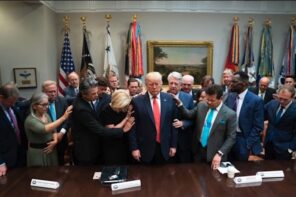This is the final post of RD and PRA’s special coverage of the Pray Vote Stand Summit. All posts can be found here. – eds
9/16/2022 Afternoon
The election reform panel is a study in fear mongering and misinformation. Jason Snead, executive director of Heritage-connected anti-voting right-wing election reform advocacy group Honest Election Project, sets the tone: “We want it to be easy to vote and hard to cheat.” Of course, it’s nearly impossible to cheat at voting, as the Trump election scandal has conclusively proven. Voter fraud is a myth.
But the data doesn’t deter Snead or his copanelist Hans von Spakovsky from parroting mainstream anti-franchisement myths. To Von Spakovsky, inaccurate voter rolls are an opportunity for fraud. Snead claims the myth of voter suppression is a method the Left uses to “avoid conversations about how to reform and improve the election system.”
Conversations on the Left about voter suppression are actually making people reluctant to vote, according to Snead. Von Spakovsky closes the uninspiring conversation by invoking the strawmen of “26,000 dead people on the rolls” in Michigan, misinformation that has been soundly debunked. Over and over and over.
Oklahoma Governor Kevin Stitt is having a rough re-election season. While Tony Perkins lauds the Governor’s signature on a law prohibiting nonbinary people from updating their birth certificates, Stitt is actually under criticism for his doctrinal evangelical anti-LGBT stances. Stitt uses his time at the Pray Vote Stand podium to double down on his anti-transgender, anti-public health, pro-oil, pro-parental rights, pro-school privatization, anti-CRT platform. While the audience loves him, Stitt is toeing a party line and Perkins is right there next to him, smiling.
The panel on alternative media sources is a refreshing surprise—Libby Emmons, editor-in-chief of Canadian conservative magazine The Post Millennial does not toe the party line. Emmons dismisses her co-panelist Rob Bluey, executive editor at Heritage Foundation’s The Daily Signal with a simple quip about the Post Millennial being an independent outlet. Mainstream media are “be-clowning themselves with nonsense and lies,” says Emmons. “They say there’s no such thing as men and women. Anyone who says there’s no such thing as men and women has no credibility.”
The audience laughs out loud, clapping. “It’s time to stop believing what we’re told,” warns Emmons, ominously. The “Trump-Russia collusion hoax.” “Rachel Levine.” “Told not to plug in their electric cars.” “Tiktokers and Instagram influencers.” Honestly, the panel feels like a semi-serious stand-up act. And the audience is eating it up.
Rep. Jody Hice (R-GA) is up next. “Democracy is in essence majority mob rule,” says Hice. “We don’t pledge allegiance to the democracy of the flag, we pledge allegiance to the . . . ,” he pauses. The crowd eagerly follows his lead, “republic”—a line popularized by the far-right John Birch Society. Like nearly every speaker at the conference, Hice goes for the low hanging fruit. “We thought that gay marriage was the end of the world,” he sets us up. “Now we have people in congress who cannot define the difference between a man and a woman. Just insanity.”
We hear hisses from the crowd for the first time after Hice trots out an esoteric right-wing misinformation campaign about Biden’s reinstatement of civil service protections for federal employees. Hice endorses the Christian nationalist creed. “The more we are told erroneously that there is a separation of church and state . . . .” He trails off, grousing about the Johnson Amendment, the law prohibiting churches with federal tax exemptions from endorsing specific political candidates.
Before the final panel, we’re unexpectedly graced with the buoyant personality of Emir Caner, president of Truett McConnell University. In 2010, Emir’s brother Ergun Caner was stripped of his deanship of Liberty University Theological Seminary when it was determined that he had deliberately lied about his upbringing in a “radical Muslim family” and being training to be a terrorist. Both Caner brothers’ stories proved instrumental in the rise of evangelical Islamophobia in the early 2000s.
This afternoon, Emir is fired up. The audience is delighted by an offhand remark about “the Chinese virus.” The bulk of Emir’s address focuses on the story of his wife’s upbringing in the former Czechoslovakia. Describing the Velvet Revolution, Czechia’s transfer of power away from the communist government, Caner tells us that what the “communist government did not expect was the sovereignty of God and the providence of his people.”
Caner also shares his parenting principles: life over death; liberty over authority; nationalism over globalism; American exceptionalism; capitalism over socialism; defense over passivism. It’s a neat articulation of the evangelical worldview.
The last afternoon panel returns to one of the conference’s central themes: the biblical worldview. Speaker Joseph Backholm, senior fellow for the Center for Biblical Worldview at the FRC, explains the importance of understanding worldview through a meme you probably saw in 2012. Two people stand on opposite sides of a six (or is it a nine?) and argue about which number it is.
Backholm initially takes the analogy in an expected direction: the two people disagree about what number it is because they’re looking at it from fundamentally different perspectives. Then he gives us his biblical worldview spin: the person who’s right about the number is the person who knows who made the number and for what purpose.
Neither person in the meme can know the truth of whether it’s a six or a nine until the author of the meme tells them. In other words, while there might be many worldviews, only God can truly tell us the truth of the world. Thus the only worldview that’s correct is the one that acknowledges God made the world, and the Bible is an account of His intent for His creation. Backholm walks us quickly and carefully through his logic.
Any worldview that doesn’t acknowledge that God is infallible and omniscient, any worldview that allows each of the people in the meme to make their own determination, or collaborate on a joint guess, is “selfish” and “hedonistic” according to Backholm. These worldviews are selfish and hedonistic in that they lead people to believe that they define their own truth and purpose for their lives.
Backholm fears that believing in bodily autonomy and multiple possible truths leads to assisted suicide, sex work, satanism, and being LGBTQ. In his words, “Some of us believe we belong to the Creator who knows what’s best for us; others believe they belong to themselves and knows what’s best for them.” Any political belief that seems to be inspired by a Godless worldview, then, is automatically false.
Backholm’s presentation loudly echoes Barna’s morning presentation and underlines a theme from the conference. The “biblical worldview” framework offers an opportunity to both inoculate evangelicals from politics-based rhetorical attacks and offer a strategy to cast doubt on others’ political beliefs without having to wade through the substance of political issues. I’m sorry, we just have a different worldview, and mine is biblical, precludes all rhetorical and theological questions.
Nik Godshall from the Summit International School of Ministry and Janae Stracke with the Heritage Action then join Backholm for a short panel to provide real-world examples. They conspicuously pivot to what looking at politics from a biblical worldview means for teaching children how to relate to the world. After discussing the importance of “discipling” children with a biblical worldview, the session smoothly ends for the adults at the conference and segues into a special Q&A for the high school and college age youth.
One of our researchers attends this special session. While enjoying pizza the aforementioned panelists respond to anonymous questions by providing more detailed strategies for how to evangelize their friends (and themselves) in the face of questions like gender identity, the separation of church and state, and whether God is good and all-powerful. The panelists hammer home to these young adults that they must always sweetly refuse to acknowledge the validity of any argument that their parents or their pastor wouldn’t agree with.
9/16/2022 Evening
After twenty minutes of low-energy musical worship, Mike Griffin, a Public Affairs Official with the Georgia Baptist Mission Board, addresses a diminished crowd for the final evening’s programming. Griffin compares FRC’s movement to the ‘sons of Issachar,’ a popular theme in New Apostolic Reformation circles, used to suggest that today’s culture warriors, as it says in 1 Chronicles 12:32, “understood the times and knew what to do.” Like many other speakers, Griffin lavishes praise upon Tony Perkins, saying God “knew how to use” Perkins to advance the movement forward.
Next Sam Brownback, longtime Christian Right operative and Former Ambassador at Large for Religious Freedom in the Trump administration, speaks to the crowd. Brownback refers to the Christian Right’s long standing legal strategy to manipulate the First Amendment’s ‘exercise clause’—in order to impose theocracy on the U.S.—as the “secret sauce” of the movement.
Celebrating recent Supreme Court ‘religious freedom’ rulings like Kennedy v. Bremerton School District and, of course, Dobbs v. Jackson—rulings that threaten to further erode the boundary between church and state in the US—Brownback claims that Chief Justice Alito personally promised him many years ago that “the court will uphold religious freedom and free exercise…but I don’t know if—but if you [faithful Americans] can uphold it in your daily life and culture.”
Brownback seems to tell the crowd that weaponizing the “free exercise” clause will remain a crucial tactic for the Christian Right moving forward. “If you want to have a traditional set of values,” he tells the crowd—“if you just wanna claim life is sacred, that marriage is a sacrament between man and a woman, that God made them male and female…you’re gonna have to stand on free exercise to claim those in the public square.”
Brownback advises activists to form state federations for religious freedom, organize diverse faith communities into these federations, and ask political candidates to take a pledge to support religious freedom. Remarkably, Brownback seems to acknowledge that the Christian nationalist movement’s exclusionary goals are not supported by the majority of Americans, telling the crowd “God never needs a majority. All he needs is a faithful remnant.”
Using the language of militarism, Brownback claims the assembled activists are front line warriors in the movement’s crusade. “We gotta stay in this fight, and you’re the core of the fight. You’re the special forces, you’re the Marines—you gotta stay in this fight.”
The night’s closing speakers are especially low-energy. While the summit’s schedule indicated that hard-right Florida Governor Ron DeSantis was invited to speak tonight, DeSantis is a no-show.
Pastor Andrew Brunson spent decades in Turkey (which he refers to as one of the largest unevangelized countries) before being thrown in Turkish prison by “satanic forces.” Brunson claims the time he spent unjustly imprisoned during the Trump presidency (causing Perkins and other Christian Right leaders to turn calls for his freedom into a major rallying cry) tested and ultimately confirmed his faith, telling the crowd that in the coming years of political struggle, their faith will be tested and confirmed as well.
Pastor Corey Brooks tells stories from his ministry in Chicago while repeating a range of tired anti-Left cliches. He is sure to rail against identity politics (that, he claims, distract us from our shared identities as Americans and children of God), gun reform (that leaves weapons in the hands of criminals), and cutting police budgets (that leaves violence-ridden neighborhoods without protection). Meanwhile, he praises the supposed virtues of free-market capitalism and ‘bootstraps’ ideology.
Finally, Pastor Carter Conlon, an FRC board member and NAR dominionist who works closely with NAR leader David Wilkerson, compares the crowd to the ancient Israelites, claiming that just as the latter struggled and freed themselves from oppression in Egypt, so shall today’s Christian Right zealots liberate themselves from the oppression they imagine they suffer under the movement’s many named enemies.
Final Thoughts
Heron Greenesmith. Senior Research Analyst for LGBTQI Justice
This was my fifth FRC Summit, my third in-person. I’ve seen Tony Perkins’ magic up close; he’s remarkably magnetic. While this year felt familiar, there were a few patterns and differences I’d like to pull out and highlight. First, as the multiple Worldview sessions illustrated, the evangelical Right is done explaining themselves to us.
They feel justified in simply, sweetly letting us know that they have a Biblical Worldview—an innate, nearly immutable characteristic that conveniently excuses any and all bad-faith arguments. They just have a different Worldview! I predict an increase in the Worldview rhetoric to support anti-abortion and anti-trans advocacy. I’m not sure if it will be accompanied by a decrease in medical disinformation.
The second trend I’d like to highlight is the disgust that radiated through the hall at every mention of transgender and nonbinary people. This crowd was ready to laugh, and they laughed quickly and loudly at any joke at trans people’s expense. They were also quick to moan aloud at every mention of trans-affirming care for youth. As Backholm taught us, we aren’t the ones who decide what to do with our bodies. That’s God.
But trans people do decide what to do with our bodies. I’m nonbinary. I recently had gender-affirming surgery to remove my uterus. I decided, on my own, with the support of my community, to make myself closer to my vision. Standing among the laughter and the disgust in that hall, I felt the gulf between us. How do we build any progress with people who fundamentally believe that bodily autonomy shouldn’t exist?
Ben Lorber, Research Analyst, Racial and Immigrant Justice
My usual focus is on white nationalist movements, and I am a relative newcomer to the organized Christian Right and its institutions. Attending this conference was an eye-opener for me. I already knew in the abstract that the Christian Right is a powerful, well-oiled machine.
But seeing the gears turning up-close and in-person, even just by attending a single conference held by a single organization at a single megachurch, drove home the degree to which institutions like the Family Research Council run a tight ship, and are well-resourced, heavily-networked and strategic in their pursuit of moral persuasion and political power.
As a researcher of the Right, I am unfortunately all-too-familiar with much of the rhetoric voiced from the stage. There was little that surprised me about the anti-LGBTQ and especially anti-trans vitriol; the gender essentialism; the posture of victimization at the hands of an imagined demonic and totalitarian Left; the appeals to family; faith; ‘common sense’ and the ‘natural order’; the focus on policy change; and other boilerplate conservative culture war rhetoric that I heard at the FRC summit.
It’s obvious that in the wake of Dobbs v. Jackson and other recent Supreme Court victories, the Christian Right smells blood in the water, is energized and on the move, and is focused not only on national and state-level electoral races but also on capturing school boards, election infrastructure and other local institutions.
What struck me more than anything else was how depressingly cult-like it all felt. Over and over throughout the three-day conference, appeals to seize political power were intertwined with direct and personal promises to soothe the deepest and most intimate wellsprings of vulnerability, suffering and insecurity felt by their followers in the audience.
Sitting in those pews, I realized in a new way that millions of people across the US have been thoroughly conditioned to believe that ‘saving America’ (in essence, through instituting an exclusionary theocracy) and saving their own soul are one and the same. In an era of widespread uncertainty, Christian Right leaders sell meaning and purpose, belonging and comfort to frightened and lonely people in order to enlist them as foot soldiers in a dreadful cause. Seeing this up close left me sad, angry and concerned for the future of our country.





